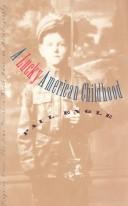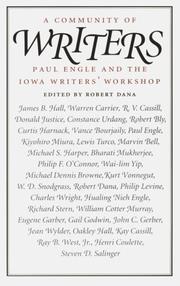| Listing 1 - 3 of 3 |
Sort by
|

ISBN: 1587290596 9781587290596 0877455406 9780877455400 9781587296369 1587296365 Year: 1996 Publisher: Iowa City University of Iowa Press
Abstract | Keywords | Export | Availability | Bookmark
 Loading...
Loading...Choose an application
- Reference Manager
- EndNote
- RefWorks (Direct export to RefWorks)
More than any other individual, Paul Engle was the spirited force behind the creative writing workshops now so abundant in America. His indomitable nature, enthusiasm, and great persuasive powers, coupled with his distinguished reputation as a poet, loomed large behind the founding of the influential Iowa Writers' Workshop. A Lucky American Childhood will appeal to people with memories of the small-town America that Paul Engle describes with such affectionate realism and to all those interested in the roots of this renowned man of letters.
Cedar Rapids (Iowa) -- Social life and customs. --- Engle, Paul, 1908-1991 -- Childhood and youth. --- Poets, American -- 20th century -- Biography. --- Poets, American --- American Literature --- English --- Languages & Literatures --- Biography --- Engle, Paul, --- Childhood and youth. --- Cedar Rapids (Iowa) --- Social life and customs. --- Cedar Rapids, Iowa --- City of Five Seasons (Iowa) --- CR (Iowa) --- City of Cedar Rapids (Iowa)
Book
ISBN: 9781609383718 9781609383725 1609383729 1609383710 Year: 2015 Publisher: Iowa City University of Iowa Press
Abstract | Keywords | Export | Availability | Bookmark
 Loading...
Loading...Choose an application
- Reference Manager
- EndNote
- RefWorks (Direct export to RefWorks)
During and just after World War II, an influential group of American writers and intellectuals projected a vision for literature that would save the free world. Novels, stories, plays, and poems, they believed, could inoculate weak minds against simplistic totalitarian ideologies, heal the spiritual wounds of global catastrophe, and just maybe prevent the like from happening again. As the Cold War began, high-minded and well-intentioned scholars, critics, and writers from across the political spectrum argued that human values remained crucial to civilization and that such values stood in dire need of formulation and affirmation. They believed that the complexity of literature—of ideas bound to concrete images, of ideologies leavened with experiences—enshrined such values as no other medium could. Creative writing emerged as a graduate discipline in the United States amid this astonishing swirl of grand conceptions. The early workshops were formed not only at the time of, but in the image of, and under the tremendous urgency of, the postwar imperatives for the humanities. Vivid renderings of personal experience would preserve the liberal democratic soul—a soul menaced by the gathering leftwing totalitarianism of the USSR and the memory of fascism in Italy and Germany. Workshops of Empire explores this history via the careers of Paul Engle at the University of Iowa and Wallace Stegner at Stanford. In the story of these founding fathers of the discipline, Eric Bennett discovers the cultural, political, literary, intellectual, and institutional underpinnings of creative writing programs within the university. He shows how the model of literary technique championed by the first writing programs—a model that values the interior and private life of the individual, whose experiences are not determined by any community, ideology, or political system—was born out of this Cold War context and continues to influence the way creative writing is taught, studied, read, and written into the twenty-first century.
American literature --- 20th century --- History and criticism --- Creative writing --- United States --- Stegner, Wallace Earle --- Criticism and interpretation --- Engle, Paul --- Cold War in literature --- Writing (Authorship) --- Authorship --- Creation (Literary, artistic, etc.) --- Stegner, Wallace, --- Engle, Paul, --- Stegner, Wallace Earle, --- Criticism and interpretation. --- E-books --- Cold War in literature. --- History and criticism.

ISBN: 1587292769 9781587292767 0877456682 9780877456681 Year: 1999 Publisher: Iowa City University of Iowa Press
Abstract | Keywords | Export | Availability | Bookmark
 Loading...
Loading...Choose an application
- Reference Manager
- EndNote
- RefWorks (Direct export to RefWorks)
With these words, written long before his Iowa Writers' Workshop became world famous, much imitated, and academically rich, Paul Engle captured the spirit behind his beloved workshop. Now, in this collection of essays by and about those writers who shared the energetic early years, Robert Dana presents a dynamic, informative tribute to Engle and his world.The book's three sections mingle myth and history with style and grace and no small amount of humor. The beginning essays are given over to memories of Paul Engle in his heyday. The second group focuses particularly on
Authorship --- Authors, American --- American literature --- Creative writing (Higher education) --- Authoring (Authorship) --- Writing (Authorship) --- Literature --- Creative writing --- Social aspects --- Biography. --- History and criticism. --- History --- Study and teaching (Higher) --- Engle, Paul, --- Friends and associates. --- Iowa Writers' Workshop. --- University of Iowa. --- Writers' Workshop (University of Iowa) --- University of Iowa Writers' Workshop
| Listing 1 - 3 of 3 |
Sort by
|

 Search
Search Feedback
Feedback About UniCat
About UniCat  Help
Help News
News